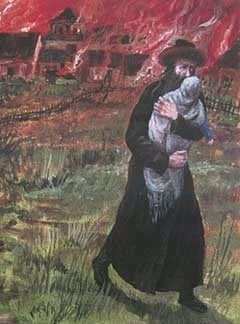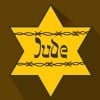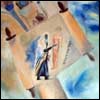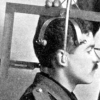The Lubavitcher Rebbe, of righteous memory, is widely recognized as one who played a singular role in defining post-Holocaust Jewry. But what did the Rebbe say and teach about that event itself?
Like millions of his generation, the Lubavitcher Rebbe was personally touched by the Holocaust. His younger brother, DovBer, was shot to death and thrown into a mass grave, as were tens of thousands of other Jews in a series of massacres conducted by the Germans shortly after their occupation of Dnepropetrovsk in the fall of 1941. A beloved grandmother and other family members were also killed. The Rebbe's wife lost her younger sister Sheina, who perished in Treblinka together with her husband and their adopted son.
In his writings and discussions on the subject, the Rebbe rejected all theological explanations for the Holocaust. What greater conceit — the Rebbe would say — and what greater heartlessness, can there be than to give a "reason" for the death and torture of millions of innocent men, women and children? Can we presume to assume that an explanation small enough to fit inside the finite bounds of human reason can explain a horror of such magnitude? We can only concede that there are things that lie beyond the finite ken of the human mind. Echoing his father-in-law, the Rebbe would say: It is not my task to justify G‑d on this. Only G‑d Himself can answer for what He allowed to happen. And the only answer we will accept, said the Rebbe, is the immediate and complete Redemption that will forever banish evil from the face of the earth and bring to light the intrinsic goodness and perfection of G‑d's creation.
To those who argued that the Holocaust disproves the existence of G‑d or His providence over our lives, the Rebbe said: On the contrary — the Holocaust has decisively disproven any possible faith in a human-based morality. In pre-war Europe, it was the German people who epitomized culture, scientific advance and philosophic morality. And these very same people perpetrated the most vile atrocities known to human history! If nothing else, the Holocaust has taught us that a moral and civilized existence is possible only through the belief in and the acceptance of the Divine authority.
The Rebbe also said: Our outrage, our incessant challenge to G‑d over what has occurred — this itself is a most powerful attestation to our belief in Him and our faith in His goodness. Because if we did not, underneath it all, possess this faith, what is it that we are outraged at? The blind workings of fate? The random arrangement of quarks that make up the universe? It is only because we believe in G‑d, because we are convinced that there is right and there is wrong and that right must, and ultimately will, triumph, that we cry out, as Moses did: "Why, my G‑d, have you done evil to Your people?!"
But the most important thing about the Holocaust to the Rebbe was not how we do or do not understand it, nor, even, how we memorialize its victims, but what we do about it. If we allow the pain and despair to dishearten us from raising a new generation of Jews with a strong commitment to their Jewishness, then Hilter's "final solution" will be realized, G‑d forbid. But if we rebuild, if we raise a generation proud of and committed to their Jewishness, we will have triumphed.
[Editor's note: The 10th day of the Jewish month of Tevet is a most tragic date in Jewish history. On Tevet 10 of the year 3336 from creation (425 BCE), the Babylonian emperor Nebuchadnezzar laid siege to Jerusalem — a siege that resulted in the conquest of the city, the destruction of the Holy Temple, and the exile of the people of Israel from their land. To this day, Tevet 10 is observed as a day of fasting, mourning and repentance. More recently, it was chosen to also serve as a "general kaddish day" for the victims of the Holocaust, many of whose day of martyrdom is unknown (Jewish law stipulates that if the day of a person's passing is unknown, an appropriate date is selected on which to say the kaddish prayer in his or her merit). On one occasion, the Rebbe devoted a significant part of a Tevet 10 address to speak about the Holocaust and convey some of the ideas expressed in this article.]







Join the Discussion